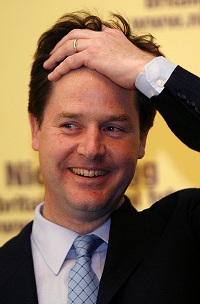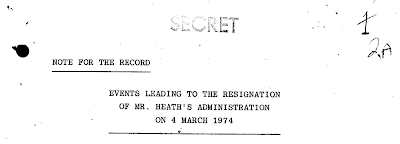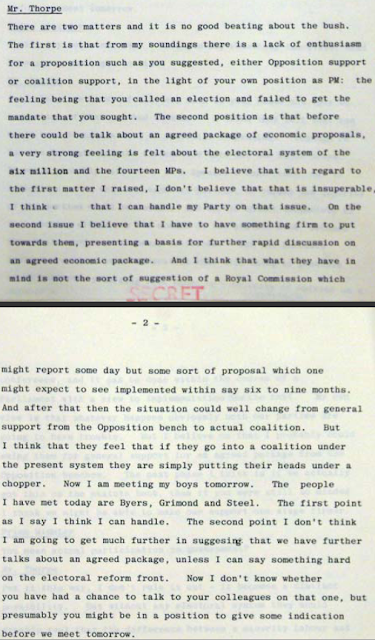On the last day of February 1974 the country went to the polls. It was a bizarre election...
A three-day week, power cuts, a miners' strike and the worsening situation in Northern Ireland had led Ted Heath to call an early election on the issue of "Who governs Britain?", against a backdrop of Liberal and SNP electoral resurgence.
In response to Heath's fatuous question, amid rain and snow in many parts of the country, the electorate delivered an impenetrable answer.
| Seats | chg | Votes | chg | |
|---|---|---|---|---|
| Con | 296 | -37 | 37.9% | -8.5 |
| Lab | 301 | +20 | 37.2% | -5.9 |
| Lib | 14 | +8 | 19.3% | +11.8 |
| SNP | 7 | +6 | 2.0% | +0.9 |
| UU | 7 | -1 | 0.7% | |
| Oth (NI) | 5 | +1 | 1.3% | |
| PC | 2 | +2 | 0.5% | -0.1 |
| Oth (GB) | 2 | +1 | 1.1% | |
| Speaker | 1 | - |
(seat changes based on notional 1970 result)
The Tories emerged from the election with the most votes, Labour with the most seats, although had the seven Ulster Unionists remained fully-fledged affiliates of the Conservative party (as they were in 1970), Heath could have legitimately claimed a seat plurality as well. The Liberals, with over 6 million votes, had insufficient seats to combine with either main party to form a majority (318 seats required).
Friday 1 March 1974
The Queen landed at 9.25am on the Friday morning, interrupting a Royal Visit to Australia. Immediately, a channel of communication was opened between Heath's Private Secretary Robert Armstrong and the Queen's Private Secretary, Sir Martin Charteris.
We notice at this early juncture it's clear that HM Queen will not become involved, and the ball is in the court of the politicians, with Heath still firmly Prime Minister.
Initial TV projections estimated Labour would finish 10 seats ahead of the Tories, and at 10.30am Energy Secretary Lord Carrington advised Heath to resign, apparently the only member of the Cabinet to do so at this point. However, computer updates showed the gap narrowing slightly, and Heath pondered his options...
Option 1) was Baldwin's choice in 1929, having chosen option 2) in 1923. The closest analogy to option 3) was the course the Liberals adopted in 1910, after losing their overall majority - to rely on Labour and the Irish Parliamentary Party for support. Heath and the Cabinet seem to have quickly ruled out option 2) on political grounds,
although Charteris confirmed this option was entirely constitutional. Again the non-intervention of The Queen is stressed...
Apparently Option 3) was first suggested via the telephone by Education Secretary Willie Whitelaw, who was confined to bed with a high fever. Throughout Friday evening attempts were made to contact Jeremy Thorpe, the colourful leader of the Liberal party. He was leading a torchlight procession through Barnstaple, and was not finally spoken to until after midnight. He agreed to meet Heath in London later on Saturday.
Saturday 2 March 1974
On Saturday the Cabinet ruled out claiming the seven Ulster Unionists as part of the Tory total. (it's seldom remembered now that that was precisely their position at all previous elections.) Indeed, the Ulster Unionists were still in receipt of the Tory Whip, but were also in alliance with Ian Paisley and others, in opposition to the Sunningdale agreement. James Molyneux and Harry West, the leader of the UUs, had sent messages to Heath on Friday, indignant that the media were classifying their party as separate from the Tories, and offering support in return for new elections in Northern Ireland. This offer was rejected because of their compact with Paisley, a person with whom the government "could have no dealings", and because shoring up the government's position with such uncertain allies would be considered "disreputable."
At 4pm Thorpe arrived in Downing Street, entering through a rear door to avoid the media pack and protestors led by Tariq Ali. It was apparent Thorpe was held on a "tight rein" and had not yet consulted his colleagues...
Heath was of the opinion that the election results could be viewed as a basis for anti-Socialist co-operation between the Liberal and Conservative parties, emphasising their policy similarities on Europe and the tackling of inflation. Liberal support could be provided informally, or via a formal pact, or in a full-blown coalition with Cabinet seats for Thorpe and one or two other Liberals. Heath thought either of the latter arrangements would be preferable to the former. Thorpe explored the possibility of a "Grand Alliance" between the three main parties and, while reiterating the Liberals' call for electoral reform, conceded that PR was not as high a priority as dealing with the country's economic difficulties. The meeting broke up with both Heath and Thorpe agreeing to consult colleagues and to meet again.
Sunday 3 March 1974
An interesting point arose over whether Heath should resign, and then be immediately invited by The Queen to lead the proposed Con/Lib coalition.
This seems at odds with the advice given above, and anyhow the circumstances in 1931 were unique. MacDonald, leading just 14 parliamentary supporters, had wanted to resign the premiership, but was prevailed upon by George V to remain in office at the head of an overwhelmingly Conservative "National" government. This point is not mentioned again, and we might infer that The Queen did not want to be seen to make such a controversial decision as her grandfather. It seems probable that had a Con/Lib arrangement been hammered out, Heath would not have bothered going to the Palace to "kiss hands" again, but would have simply remained in office to meet Parliament.
At 3.30pm Thorpe rang, to say that he had consulted some, but not all, of his colleagues, and that another conversation with Heath was desirable. This was arranged for 5.30pm to be conducted on the telephone. Immediately after this call news arrived that a British Airways VC10 had been hijacked en route from Beirut to London...
When Thorpe rang back, an extraordinary conversation with Heath ensued ...
The Liberal party as a whole wanted Heath to fall on his sword, to be replaced by a new Tory leader, but Thorpe felt that he could "handle" his party on that question. The Liberals were unable to enter into a formal deal at the moment, but if there was quick movement on electoral reform, they would consider a full coalition thereafter. Thorpe went on to suggest PR for the boroughs, and the Alternative Vote for the counties, to be implemented within six months. If that was agreeable the Liberals could offer "general support" from the Opposition benches, to keep Heath in office, until reform was delivered, when their support could be "firmed up" into full coalition.
The doctrine of collective responsibility, not to mention the practicality of a leadership election, doubtless made a change of leader difficult for the Cabinet to contemplate, and it was firmly rejected.
The Cabinet was by now of the view that nothing short of a full coalition with the Liberals would be worth while pursuing, and only a Speaker's Conference followed by a free vote in Parliament could address the issue of electoral reform.
Amid rain, Thorpe arrived in a deserted Downing Street at 10.30pm for a half-hour meeting with Heath, who informed him of the cabinet's position on the leadership issue and electoral reform. Thorpe accepted the reasonableness of their views, and in a last attempt to come to a deal, offered Liberal support for some 20 months (from the imminent Queen's Speech to the next, scheduled for November 1975) in exchange for an "indication" from the Conservatives that they "recognised the injustice of the present system and were in favour of changing it to a system...which was fairer to the minority groups."
Monday 4 March 1974
The Cabinet met at 10am for a full discussion of the Thorpe-Heath conversations and to draft a formal letter to the Liberal leader, who was meeting with all his colleagues at 11am. Barring a last-minute breakthough it was clear to the Cabinet that the government would be going out of office later that day. The rest of the day was occupied with the time-consuming formalities.
The letter was delivered by hand to Thorpe at the House of Commons at 12.15pm and the Liberals' meeting broke up at 1pm. Press releases were prepared and distributed. Thorpe's reply finally arrived at 4.15pm. In it he called for electoral reform and a government of National Unity, composed of all parties...
Heath chaired his last cabinet meeting at 4.45pm to consider Thorpe's response, and then indicated he was seeking an audience with The Queen at 6.30pm.
All that remained was for Robert Armstrong to telephone Marcia Falkender to tell Harold Wilson to expect a call from the Palace...
Analysis
1. The politicians were clearly unprepared for the arrival of the first hung parliament since 1929. Little was done by the Conservatives on the Friday to construct a majority. The Liberals, representing in the main far-flung constituencies, were unable to get together until Monday. Thorpe's visits to Downing Street over the weekend were not as plenipotentiary, but kite-flyer.
2. Contrary to most history books, Thorpe did not demand pure STV, but only unspecified "PR" for the boroughs and the Alternative Vote for the counties, which was finally watered down to an "indication" from the Tories that they recognised the injustice of the present system and were in favour of changing it to one "fairer" to the minority groups. If a similar situation arises in 2010 could the Lib Dems also compromise? Since an AV referendum is already supported by Labour, would the Lib Dems try to extract either AV+ with a relatively small top-up (say 10%), or STV for just the larger cities?
3. The longer the uncertainty continued, the firmer the commitment the Cabinet required from the Liberals to participate fully in a coalition, while that possibility simultaneously receded. They simply ran out of time. Had the numbers been a little more favourable, with the Liberals capable of giving the Tories an overall majority, could a looser alliance have been agreed upon sooner?
4. Heath is to be commended for not taking the easy option of rapprochement with the Tories' natural allies, the Ulster Unionists, which at least might have given him a breathing space until the meeting of Parliament.
5. Did Heath "cling on to office"? I'm of the opinion that any PM faced with an inconclusive result has a duty to first explore the possibility of forming a stable government. The problem in 1974 was no-one was prepared for the election outcome, the attempts were shambolic, and as noted previously, the numbers were unfavourable anyhow. I believe Heath and the Cabinet acted entirely honourably, but perhaps they were politically unwise to allow matters to drag on as long as they did.
documents:
Robert Armstrong's memorandum
and PREM15/2069
at the Thatcher Foundation


















![Reblog this post [with Zemanta]](http://img.zemanta.com/reblog_e.png?x-id=8101c79f-1151-4c10-8b69-8fc153c50963)
Thanks for this detailed analysis. I'm always very interested to read about the two elections of 1974. My local seat is Lichfield and in 1974 Lichfield and Tamworth was one of the small number of seats which changed hands between February and October. (Both towns have their own constituency today which is a measure of the level of population increase in south east Staffordshire). In February 1974 the Conservative majority in L&T was 1,807 and in October Labour gained it with a majority of 331. Bruce Grocott was the successful Labour candidate; he was Tony Blair's PPS from 1994 to 2001, but that was as MP for The Wrekin. He's in the Lords now.
ReplyDeleteThe UK is in the midst of a deep financial and economic crisis. We also face a General Election within a matter of months. At the same time disillusionment with MPs and politics has never been higher - and trust in the working of the banking and financial system has never been lower. I have found a great new website where you can discuss the possibilty of a Hung Parliament, its www.charter2010.co.uk
ReplyDeleteYou should add www.charter2010.co.uk to your list of 'websites of intertest'
ReplyDelete